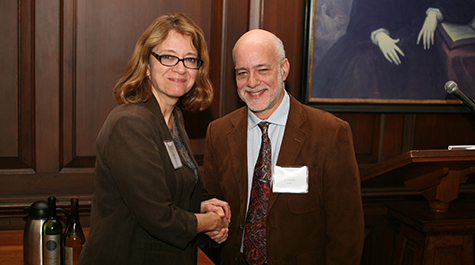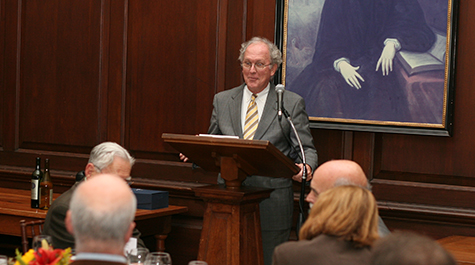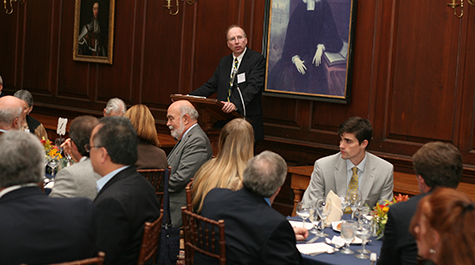Joseph William Singer Honored With 2015 Brigham-Kanner Prize
Harvard Law School’s Joseph William Singer has been awarded the 2015 Brigham-Kanner Property Rights Prize. Named in recognition of Toby Prince Brigham and Gideon Kanner for their lifetime contributions to private property rights, the prize recognizes scholarly or professional achievements that affirm the importance of property rights to individual liberty.
Singer was honored at a dinner in the Great Hall of the historic Sir Christopher Wren Building on Oct. 1, inaugurating the 12th Annual Brigham-Kanner Property Rights Conference at William & Mary Law School. The conference included the following panels: “Property as a Form of Governance,” “Civil Forfeiture of Property,” “Of Pipelines, Drilling, & the Use of Eminent Domain,” and “Property Rights in the Digital Age.”
During the awards dinner, Conference Co-Chairman Joseph T. Waldo, a 1978 graduate of the Law School, and founding partner of Waldo & Lyle in Norfolk, Va., spoke of the annual event’s importance to property rights. “The academy needs to interact with the practicing bar, and the practicing bar needs to learn from the academy,” Waldo said. “The conference has been a great exchange of practice experience and theory.”
Waldo added that property rights are fundamental to all human beings and give people human dignity. “What we are trying to do here is to raise awareness and the platform for the discussion of property rights not only in the United States but throughout the world,” he said. “We could not enjoy our civil rights without the protections of property rights.”
According to Lynda Butler, William & Mary’s Chancellor Professor of Law and director of the Property Rights Project, the Brigham-Kanner Prize is awarded each year to “someone who has thought deeply about the human condition and about property’s relationship to our political, economic, and social systems.”
“This year’s recipient, Joseph Singer, falls squarely in that condition,” Butler said. “He is without a doubt one of the most prolific property scholars of our time. In 2015 alone he published five articles and one new book.”
Butler praised Singer’s passionate writing style as eloquent, but accessible to all. She also mentioned his blog on property law developments, which updates readers on topics ranging from A to Z—“Adverse Possession” to “Zoning.”
Singer received a B.A. from Williams College in 1976, an A.M. in political science from Harvard in 1978, and a J.D. from Harvard Law School in 1981. He clerked for Justice Morris Pashman on the Supreme Court of New Jersey from 1981 to 1982 and was an associate at the law firm of Palmer & Dodge in Boston, focusing on municipal law, from 1982 to 1984.
Singer began teaching at Boston University School of Law in 1984, and joined the faculty at Harvard Law School in 1992. Appointed the Bussey Professor of Law in 2006, he teaches and writes about property law, conflict of laws, and federal Indian law. He also writes about legal theory with an emphasis on moral and political philosophy.
He has published more than 70 law review articles and is an executive editor of the 2012 edition of Cohen's Handbook of Federal Indian Law (with 2015 Supplement). He also has written a casebook and a treatise on property law, as well as No Freedom Without Regulation: The Hidden Lesson of the Subprime Crisis (2015), Entitlement: The Paradoxes of Property (2000), and The Edges of the Field: Lessons on the Obligations of Ownership (2000).
Dean Douglas concluded the evening by noting how great a privilege it was to honor Singer as the latest recipient of the Brigham-Kanner Prize.
“It means a lot to me that we have conferred this award on someone with such humane instincts and such an obvious sense of humanity,” Douglas said.
Prior recipients of the Brigham-Kanner Prize include Professor Frank I. Michelman, Harvard Law School (2004), Professor Richard A. Epstein, University of Chicago Law School (2005), Professor James W. Ely, Jr., Vanderbilt Law School (2006), Professor Margaret Jane Radin, University of Michigan Law School (2007), Professor Robert C. Ellickson, Yale University (2008), Professor Richard E. Pipes, Harvard University (2009), Professor Carol Rose, University of Arizona (2010), Retired Associate Justice of the United States Supreme Court Sandra Day O’Connor (2011), Professor James E. Krier, University of Michigan (2012), Professor Thomas W. Merrill, Columbia Law School (2013), and Michael M. Berger of Manatt, Phelps & Phillips (2014).
About William & Mary Law School
Thomas Jefferson founded William & Mary Law School in 1779 to train leaders for the new nation. Now in its third century, America's oldest law school continues its historic mission of educating citizen lawyers who are prepared both to lead and to serve.


